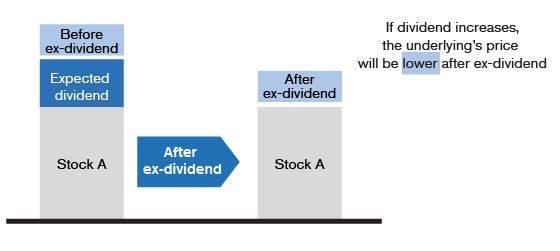Guide for the More Experienced

-
When the dividend distribution is in line with expectations
Although warrant investors will not receive dividends, stock dividends will still impact the warrant price, because the stock price will change after dividend distributions.
However, when a warrant issuer issues a warrant, the warrant price has already taken into account the impact of dividends based on the stock’s dividend distribution record and market expectations. Therefore, if the stock has a stable dividend distribution policy and the distributed dividend is in line with expectations, in theory it will not have any impact on the warrant price.
-
When the dividend distribution is not in line with expectations
A company will adjust its dividend policy in good time according to factors such as its business performance and policies. If the interim dividend or final dividend are different from market expectations, the warrant price will be affected.
In general, if a company increases the dividend to a level higher than the market’s expectations, the ex-dividend price of the stock will be lower than expected, and if the expiry date of the warrant is after the ex-dividend date, a call warrant will be subject to a negative impact, while a put warrant will benefit. A real-life example is when the mainland insurer Ping An Insurance (2318) increased its final dividend in 2018 from RMB 0.55 to RMB 1, more than a 80% increase.
When a company unexpectedly reduces its dividend, the ex-dividend price of the stocks will be higher than expected, and if the expiry date of the warrant is after the ex-dividend date, a call warrant will be affected positively, while a put warrant will drop. A real-life example is when the telecom stock China Unicom (0762) unexpectedly failed to pay any final dividend in 2017.
Dividend payout Call warrants Put warrants More than expected Drop Rise Less than expected Rise Drop It is worth noting that the relevant impact will be reflected immediately in the trading session following the date when the company declares a dividend distribution, and not having to wait until the ex-dividend date.
-
Special dividends
Companies occasionally distribute special dividends. Because special dividends are not expected, the warrant issuer naturally cannot reflect them in the warrant price when the warrant was issued. Therefore, when special dividends are declared, warrants deal with it in the following way:
If
1.the payout amount of the special dividend is more than
> 2% of the price of the underlying
asset on the date of declarationThe issuer will adjust the warrant’s terms (such as the exercise price and the entitlement ratio) according to the dividend distribution ratio. The precondition for the adjustment is that investors will not suffer a loss due to the change of the terms. Therefore, in theory, the warrant price will not be affected.2.the payout amount of the special dividend is less than
< 2% of the price of the underlying
asset on the date of declarationThe warrant’s terms will not be adjusted. Because the ex-dividend stock price will be reduced,
a call warrant will be negatively affected, while a put warrant will benefit. The relevant impact will be reflected immediately in the trading session following the company’s declaration of dividend distribution, a situation similar to when the dividend amount is more than expected.

